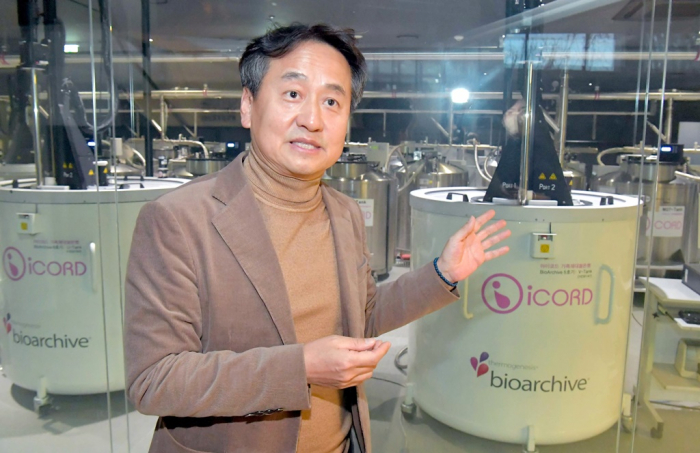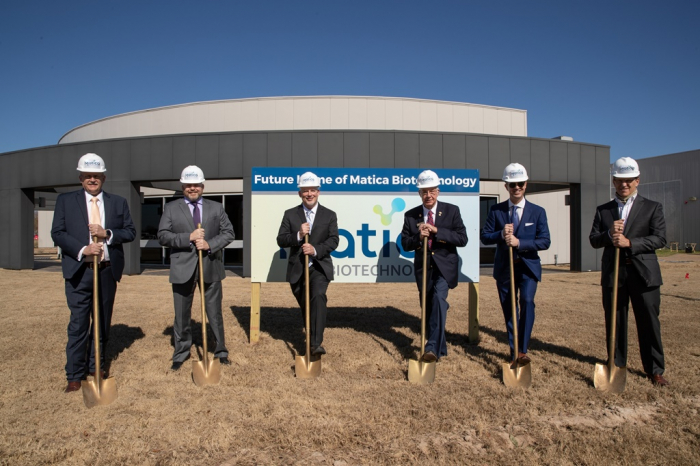Korea’s CHA Biotech to triple US CDMO capacity
Seeking site for expansion before Texas CDMO plant starts operation
By Jan 05, 2022 (Gmt+09:00)
LG Chem to sell water filter business to Glenwood PE for $692 million


KT&G eyes overseas M&A after rejecting activist fund's offer


Kyobo Life poised to buy Japan’s SBI Group-owned savings bank


StockX in merger talks with Naver’s online reseller Kream


Meritz backs half of ex-manager’s $210 mn hedge fund



CHA Biotech, South Korea’s stem cell therapeutics developer, is set to expand its biomaterials contract development and manufacturing organization (CDMO) business.
The company decided to triple the capacity of its US plant for viral vectors used in cell and gene therapies in order to beef up its biopharmaceutical and CDMO business into a cash cow for investment in new drug development.
“We decided to triple the size of the CDMO facility in Texas that is currently under construction,” said CHA Biotech CEO Oh Sang-hoon on Jan. 4.
CHA Biotech is building the 3,300 square-meter CDMO plant, which can produce some 500 liters of viral vectors for clinical trials in phase 1 or 2, with a schedule to complete the construction in the first quarter and start mass production in the first half. A viral vector is a key component of gene-modified cell and gene therapies such as anticancer drugs.

TO TRIPLE US VIRAL VECTOR FACILITY
The company decided to expand its capacity even before the facility begins operations.
“Demand surged so much that we are in talks over CDMO with about 50 companies. So, we are looking for a land of 6,600 square meters to supply materials for medicines in phase 3 trials or already commercially available,” Oh said. It aims to grow into a major CDMO in the US that supports the production of commercialized drugs.
The production of viral vectors itself proves a biopharmaceutical maker’s competitiveness. Demand for the vectors used to insert generic substances into immune cells such as T cells has been soaring in line with growth in the global cell and gene therapy market.
The global cell and gene therapy CDMO market was forecast to increase by more than 냩 times to 12 trillion won ($10 billion) by 2026 from 1.8 trillion won in 2019, according to South Korea’s National Biotech Policy Research Center. The industry expected a few major players to dominate the market.
AIMS TO PRODUCE CELL THERAPIES IN US
CHA Biotech also aims to produce cell therapies in the US in the future, expanding its business from substances of the therapies.
The company is currently building a CDMO plant in South Korea for the mass production of cell therapies with stem cells and immune cells. It is scheduled to complete the construction in 2024.
“We already secured ten CDMO deals related to cell therapies at home and we are working on them,” Oh said. “We will produce cell therapies in the US, utilizing know-how in the domestic cell therapy production.”
CHA Biotech is set to announce the result of clinical trials for a new drug soon. The company decided to unveil the outcome of phase 1 clinical trials in South Korea for CBT101, a cell therapy to treat recurrent glioblastoma, later this month. It plans to apply for phase 2 trials next month for the drug used natural killer cell, one of the immune cells.
“Recurrent brain tumors have an average survival period of ten months, but there was a case of survival of more than eight years among the trial participants,” Oh said. “Once we confirm the efficiency in phase 2 trials, we will push for US clinical trials.”
The US Food and Drug Administration (FDA) designated the CBT101 as a rare drug for recurrent malignant neuropods in September 2020, providing incentives such as priority on the authority’s review for approval and exemption from user fees.
Write to Ju-Hyun Lee at deep@hankyung.com
Jongwoo Cheon edited this article.
-

-
 Korean chipmakersSamsung in talks to supply customized HBM4 to Nvidia, Broadcom, Google
Korean chipmakersSamsung in talks to supply customized HBM4 to Nvidia, Broadcom, Google19 HOURS AGO
-
 EnergyLS Cable breaks ground on $681 mn underwater cable plant in Chesapeake
EnergyLS Cable breaks ground on $681 mn underwater cable plant in ChesapeakeApr 29, 2025 (Gmt+09:00)
-
 Business & PoliticsUS tariffs add risk premium to dollar assets: Maurice Obstfeld
Business & PoliticsUS tariffs add risk premium to dollar assets: Maurice ObstfeldApr 29, 2025 (Gmt+09:00)
-



